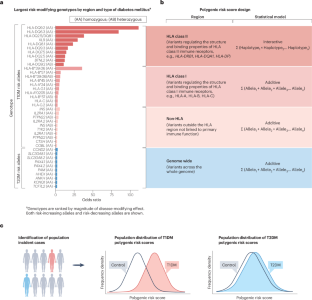Diabetes mellitus polygenic risk scores: heterogeneity and clinical translation
IF 40
1区 医学
Q1 ENDOCRINOLOGY & METABOLISM
引用次数: 0
Abstract
Diabetes mellitus encompasses several disorders, each with differing clinical presentation, prognoses and pathophysiology. Distinct polygenic architectures underlie type 1 diabetes mellitus and type 2 diabetes mellitus, and govern numerous pathophysiological pathways that converge on dysglycaemia. Over the previous decade, polygenic risk scores (PRS) derived from large genome-wide association studies have become broadly recognized for their potential in precision medicine. PRS, and now partitioned polygenic scores generated by clustering of risk variants, can quantify individual genetic predisposition to diabetes mellitus and reveal molecular heterogeneity responsible for variation in clinical presentation and prognoses. In this Review, we examine and contrast progress in the development of type 1 diabetes mellitus PRS and type 2 diabetes mellitus PRS, and discuss paths to further methodological advances. We examine how studies in the past 10 years have harnessed PRS and novel partitioned polygenic scores to reveal insights into diabetes mellitus aetiology and characterize changes in cellular and tissue-specific disease-modifying molecular pathways. Additionally, we discuss advances and opportunities in areas of clinical translation, including improved classification of diabetes mellitus type, screening of those at risk and personalized interventions informed by PRS. Finally, we emphasize the urgent need to overcome ancestry-related challenges and highlight current progress and gaps in ensuring the equitable translation of PRS for diabetes mellitus precision medicine. In this Review, the authors discuss different methods for assessing polygenic risk of diabetes mellitus and the utility of polygenic risk scores in classifying and screening for diabetes mellitus. The current limitations of these scores and ways of overcoming these limitations are also covered.


糖尿病多基因风险评分:异质性和临床翻译
糖尿病包括几种疾病,每一种都有不同的临床表现、预后和病理生理学。不同的多基因结构是1型糖尿病和2型糖尿病的基础,并控制着许多聚集在血糖异常上的病理生理途径。在过去的十年中,来自大型全基因组关联研究的多基因风险评分(PRS)因其在精准医学中的潜力而得到广泛认可。PRS和现在由风险变异聚类产生的分区多基因评分,可以量化个体对糖尿病的遗传易感性,并揭示导致临床表现和预后变化的分子异质性。在这篇综述中,我们对1型糖尿病PRS和2型糖尿病PRS的发展进行了回顾和比较,并讨论了进一步的方法学进展。我们研究了过去10年的研究如何利用PRS和新的分区多基因评分来揭示糖尿病病因学的见解,并表征细胞和组织特异性疾病修饰分子途径的变化。此外,我们还讨论了临床翻译领域的进展和机遇,包括改进糖尿病类型分类,筛查高危人群和个性化干预。最后,我们强调迫切需要克服与祖先相关的挑战,并强调目前在确保糖尿病精准医学PRS公平翻译方面的进展和差距。
本文章由计算机程序翻译,如有差异,请以英文原文为准。
求助全文
约1分钟内获得全文
求助全文
来源期刊

Nature Reviews Endocrinology
医学-内分泌学与代谢
CiteScore
42.00
自引率
0.70%
发文量
158
审稿时长
6-12 weeks
期刊介绍:
Nature Reviews Endocrinology aspires to be the foremost platform for reviews and commentaries catering to the scientific communities it serves. The journal aims to publish articles characterized by authority, accessibility, and clarity, enhanced with easily understandable figures, tables, and other visual aids. The goal is to offer an unparalleled service to authors, referees, and readers, striving to maximize the usefulness and impact of each article. Nature Reviews Endocrinology publishes Research Highlights, Comments, News & Views, Reviews, Consensus Statements, and Perspectives relevant to researchers and clinicians in the fields of endocrinology and metabolism. Its broad scope ensures that the work it publishes reaches the widest possible audience.
 求助内容:
求助内容: 应助结果提醒方式:
应助结果提醒方式:


